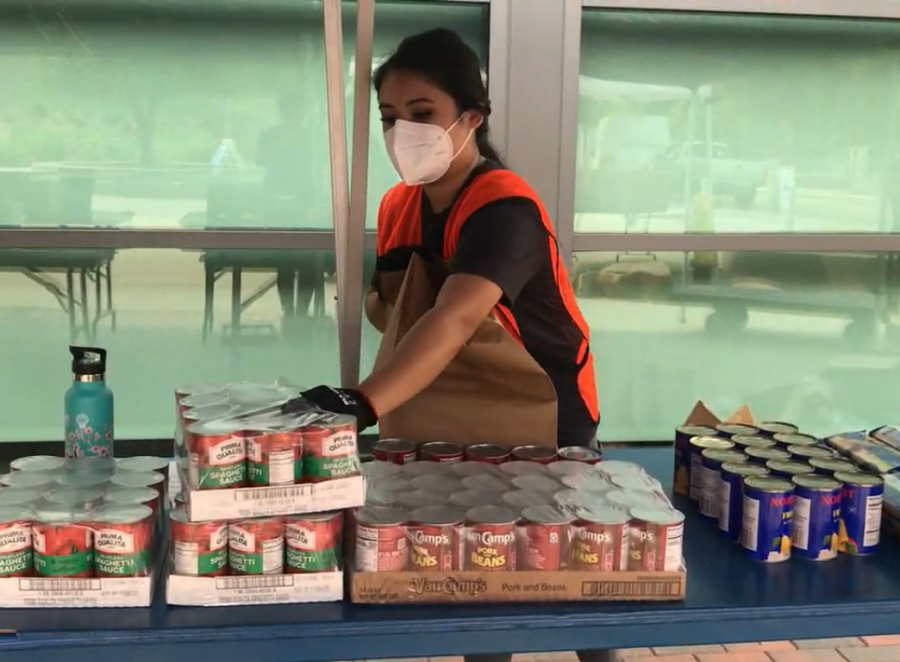ASI Cougar Pantry temporarily suspended, to reopen in mid-February
A Cougar Pantry staff member assembles a bag of groceries. The Cougar Pantry will reopen on Feb. 17.
February 5, 2021
To see this story in video form, click here.
ASI Cougar Pantry will not resume food distributions until Feb. 17, according to an update posted on their website. The Cougar Pantry did not hold distributions over winter break, but was originally scheduled to start up on Jan. 27.
“The decision is a result of the high number of cases of COVID-19 that are still impacting our region. In San Diego County, the virus is rated as widespread and our region continues to be under stay-at-home orders,” read the Jan. 22 update in part.
San Diego County was under a regional stay-at-home order at the time the update was released, but Governor Gavin Newsom lifted the stay-at-home order on Jan. 25. The county remains in the purple tier, the most restrictive tier of the state’s color-coded reopening system.
Cougar Pantry coordinator Alondra Gutierrez said that due to the high number of cases in the region, the university told campus resource centers to pause in person activities to discourage students from going to campus.
“The university told us that we had to postpone our distributions,” said Gutierrez. “We were all ready to go for that first week of school, but unfortunately, because of the stay-at-home order and, like I said, the campus [regulations], we had to postpone our start date.”
University spokesperson Margaret Chantung confirmed that CSUSM issued guidance to pause in person activities until Feb. 15. “Due to public health conditions and the holiday-related COVID-19 surge in cases, the limited number of face-to-face classes and services that had been previously available were put on pause out of concern for health and safety,” she said in an email to The Cougar Chronicle.
The Cougar Pantry previously suspended distributions in December when a team member tested positive, a decision which some students criticized at the time.
Several students commented their disapproval on ASI’s Dec. 4 Instagram post that announced the shutdown of the pantry for the remainder of the fall semester. This time, however, there hasn’t been as strong of a negative reaction; on ASI’s Jan. 22 Instagram post that announced that the pantry wouldn’t resume until Feb. 17, no one commented against the announcement.
“I’d assume it’s because students understand that we are in that purple tier … we just want to avoid any type of spread [of COVID-19],” said Gutierrez on the reduced backlash for the delayed reopening of the Cougar Pantry.
Still, some students think the Cougar Pantry should have reopened when the spring semester started. Among them is Zameer Karim, a fourth-year pre-law political science major who also serves as Student at Large for the University Police Department Community Engagement Group and Student at Large for the ASI Internal Operations Committee.
Karim said the decision appeared to be made in a “unilateral” way without student input.
At MiraCosta College, where Karim’s wife attends, food distribution services are currently going on, although the college did stop food distributions during the most recent stay-at-home order.
“They’re still offering it during COVID, they figured out a way to do it safely, so I just feel that if other schools can figure out a way to do it safely, we should be able to as well,” he said.
UC San Diego (UCSD) is another college in San Diego County that is still running their food pantries. Unlike MiraCosta College, UCSD did not stop their distributions during the stay-at-home order. San Diego State University stayed open during most of the stay-at-home order, although they did close for about two weeks because of the holidays.
On the other hand, Palomar College has suspended its food pantry ever since the pandemic started in March.
Another student that thinks CSUSM’s Cougar Pantry should be open is Gabriella Hakopian, a first-year global studies major who is also a member of campus organization Feminists Unite.
“I think that it’s unfortunate that this was the decision that was made, because a lot of students right now, especially during this pandemic, are suffering from food insecurity,” said Hakopian. “So you have students that cannot wait until Feb. 17; they need food now, they need these resources now.”
“When you don’t have food to eat, it can cause poor academic performance and sleep quality and can lead to poor mental and physical health,” she added.
Gutierrez said the Cougar Pantry is looking forward to when they can reopen again. “We wish we could have started the first week of school, and it’s unfortunate that we had to put a pause on that, but we’re ready to go for the 17th, and I’m excited to be able to serve our students,” she said.
While the Cougar Pantry might not be offering food distributions for another couple of weeks, they did launch a food box program on Feb. 1, using funds that they raised from donors on Giving Day. They will give out 100 boxes in February and 50 in March.
“We are aware that there are students who might not be able to drive to our distributions because they don’t have transportation or because they just don’t live near San Marcos … we wanted to provide this opportunity for students,” said Gutierrez.
The program is intended for students outside of CSUSM’s service area who can’t access local food resources. The boxes will contain meal kits by a company called HelloFresh and will be shipped directly to students’ homes.
As of now, the food boxes are a one-time offering, not a monthly or weekly subscription service, and supplies are limited. To sign up for a food box, fill out this sign-up form.
The Cougar Pantry is also collaborating with the Cougar Care Network on the possibility of giving grocery store gift cards to students with an immediate need.
To learn more about local food resources, visit this site.
For the latest updates on the Cougar Pantry, visit their website or Instagram account (@asi.csusm).






